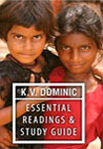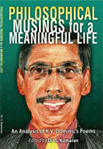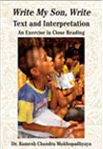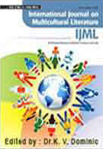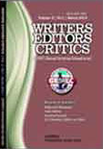Book Details
Write Son, Write (Collection of Poems)
Year Of Publish:
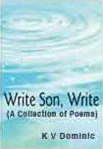
K. V. Dominic’s Write Son, Write. New Delhi: GNOSIS, 2011.
99 pp. Paperback. Rs. 125. ISBN: 978-81030-25-7.
Write Son, Write
K. V. Dominic
Gnosis, New Delhi 2012
Dedicated to
My Beloved Mother,
(Late) Rosamma Varghese, Kannappilly
Preface
This is my second collection of poems, an outcome of my fourteen months’ poetic voyage from September 2009 to November 2010. My first anthology, Winged Reason, was the outpouring of my five years’ itching mind. The long difference in the tenure shows that my mind has been becoming more and more unrest. Naturally, the more unjust and disquiet the world becomes, the more distressed and desperate would be the poet’s mind.
As poetry is the shortest form of literature, most captivating and didactic, I believe that in this busy, hustling world people should have a special attraction to poetry. Since reading habits of modern man diminish considerably and she/he substitutes that habit to watching TV and such visual media, I believe that it is my duty as a writer to promote poetry at any cost. I have already published four edited books consisting of innumerable critical articles on the poetry of established and emerging contemporary Indian poets in English.
People today are crazy after materialism, and divinity in them is being lost to such an extent that they give no importance to principles, values, family and social relations, cohabitance with human beings and other beings. Instead they are trying their maximum to exploit their fellow beings, other beings and the planet itself. If it goes like this, the total destruction is not far away. It is the duty of the religious leaders, political leaders and the intelligentsia to inject the lost values to the masses and thus preserve this planet and the inhabitants from the imminent devastation. Instead, majority of these leaders become mafias and inject communal and corruptive venom to the minds of the masses. Corruption has become the hallmark of these leaders and influenced by them the masses also deviate from the right track to the evil track. And who will save this society? My answer is: writers, particularly poets who are like prophets.
Though the present century, like the previous one, is that of fiction, there are innumerable great poets and great poems in English literature as well as literatures of other languages. Fiction has become an addiction to the present readers. The publishers and the award committees are responsible for this addiction. They can very well change the tastes of the readers if they will. Let me emphasise and underline once again that there have been greater poems to the great fictions which have won the awards in this decade as well as in the previous ones. Save a few established Indian poets in English, majority of the Indian poets writing in English publish their excellent anthologies spending thousands from their pockets. Journals are their only haven where they can post their individual poems just taking the subscriptions. Indian poetry in English should be promoted by the governments, both central and states, by giving awards and grants to the poets because it is the mouthpiece through which India proclaims her great values, ethos, cultures, traditions, myths, legends, landscapes, faunas, climates etc. to her own children and people abroad. Schools, colleges and universities in India should include more of this poetry in the text books.
There are thirty poems in this anthology. The opening poem “Write Son, Write” is indeed the manifesto of my views and philosophy. Divided into twenty one parts, it declares my views of God, Man and Nature. There are two poems in this book which were born out of my tears. My mother, to whom I owe all my virtues, departed me on 14th October 2010. From the deep sorrow came out the poem “An Elegy on my Ma.” This book itself is dedicated to her. A month later, my neighbour, a man of high rank in the society, poisoned to death all my four favourite cats which made our house a heaven. This massacre was as shocking as my ma’s death and it gave birth to the poem “Massacre of Cats.” Even now I am drowned to agony whenever my mind draws me to those tragedies.
Before winding up my preface let me express my deep gratitude to Mr. Sudarshan Kcherry, the publisher of Authorspress, New Delhi. He is a mentor to me in shaping my philosophy. I have put into the poems whatever philosophy I could absorb from him. I don’t believe if there is any other publisher in the world who inspires his writers to their works and publish the books never worrying about the material gain. The contribution this man does to Indian literature in English, particularly poetry, is greater than that of the greatest English writer in India. Hats off to him, and let his breed multiply!
Finally I present a bouquet of thanks to Mr. K. K. Anas, the cartoonist and illustrator of this book. He is my former student who is doing Ph.D now in France. Anas is an acclaimed cartoonist who drew illustrations for my first anthology Winged Reason also. Thanking once again everyone who inspired me and helped me in the composition of this book and wishing my readers a mental feast, I wind up.
Thodupuzha, Kerala,
December 2010.
Foreword
In Write Son, Write K. V. Dominic is truthful and gracious to artistic ingenuity like his earlier collection of poems Winged Reason. Here, the poet appears to carry forward and strengthen the argument of social reform he initiated in “Winged Reason.” This provokes man to think deep. Contemporary times are a challenge to true art and creativity. An age of crisis at multiple levels with epileptic anarchy defies definition. A simple living is gravely imperiled by impatience and frustration particularly at the grassroots-stage. If life is observed intimately, the crisis appears forbidding. Dominic’s social consciousness is his chief forte. Not for a moment, he diverts attention from the simple and innocent activities of ordinary human beings. From his lyrics originate feelings of eternal sympathy, peace and fraternal unity.
One discerns a distinct pattern in thoughts and feelings. Deep down, one finds a divine presence in each part of the body. One is stunned by an immensely touching verse, “An Elegy on my Ma.” The lyric, if at one level, speaks of an intense personal tragedy; it also generalizes a man’s attitude to relations and thus a callous truth is revealed. Its’ delicate treatment stirs sensitive hearts, and delicately but brusquely speaks for all of us. How children worship and then ignore Ma. Perhaps, in oblique words, the poet laments at the heartlessness of children. A similar fate visits a man at the fag end of life but still one rarely learns to value relations, the poet appears to say. “Write My Son, Write” is a long engaging verse that celebrates creation’s inherent blessings in living and non-living. Nature is not only a symbol of destruction but it is harmony and symphony incarnate with profusion of love. The poet wants vividly to acquaint the growing son about nature and the world of man. Nature is caring, divine and loving whereas man is violent, cruel, selfish and egoist. At another level, it is God’s divine dictates to His children on earth to work in the spirit of prayer and it will lead man to meaning and fulfilment.Man never quite easily works for peace and love. Religion and knowledge look empty. Political weapons and corporate culture humiliate creations of God and if one tries to unearth solutions with the power of intellect, an absolute hypocrisy drives man to imminent disaster, he appears to say. Rhythm in each particle, molecule and atom of this world is what, a man must understand and there exist peace, harmony and symphony of life. The poet is not irrelevant when he speaks painfully about the role of intellectuals and religious people while observing in “Write My Son, Write”:
Intellectual mafia
assumes omniscient;
exploits innocent people;
detracts them
. . . . . . . . .
imposes their
obsolete philosophies.
He is sensitive and fairly poignant while observing the miserable living conditions of man and suggests that when man refuses to fall back on dead and archaic ideas, he can certainly touch borders of benign culture and civilized living because there is hardly any difference “between religious / and intellectual mafias.” This long lyric reveals poet’s philosophy of education. Poet’s anxieties about human life and destiny are genuine when he experiences violent and inhuman, unsympathetic and callous attitude of man.
Man does not grow with puffed up ego and pride. By killing egoistic mind-set, life turns evocative. Poet’s sympathies are reserved for women. He cannot withstand any harsh treatment meted out to women irrespective of age and status. A girl glues to the book in difficult times in an effort to realize aspirations of life when even nature in the shape of a cuckoo: “prays for her perseverance. / The gentle breeze strokes her / and soothes her tense mind.” (“A Desperate Attempt”) It provokes the poet to warn man of unkindly approach to life and indirectly the poet wants man to listen to nature and learn. As a firm humanitarian, he cannot hate God’s creation and so love for the animal world is immense. He loves birds, insects and little flying objects. One gets a clear message – if man loves all, he will never hurt or impair not even beasts or snakes, for love knows no barriers.
The poet believes in the eternal principles of love, sympathy and non-violence. These are unifying forces and man lives harmoniously if he learns to love that is strengthened in the school of life. “Write my Son, Write” is one of the finest poems, for it is also a testament on life in gentle words. There is nothing intellectual or ethical or religious or political here. Man, if learns to live beyond hate and tyranny, violence and exploitation, possibly a better world would emerge. Even trivial acts or words do not escape poet’s keen eyes and he eagerly scrutinizes low and high, small and big, the poor and the rich with impartiality. Abundant miseries and sufferings, in the life of the poor disturb. That, women still live in subjugation with fears and uncertainties, create upheavals in the mind of the poet. He condemns this attitude of male-dominated society. Poverty, hunger,
corruption, sufferings, exploitation, inhuman outlook, waste of public money, subtle atrocities resorted to by the intellectual and political mafia cause agony to the poet. Uninterrupted and perpetual concerns about man’s life on earth make Dominic’s poetry unique. He is sensitive, eager and compassionate and is anguished at the all-consuming sufferings. Symbol of crow highlights venomous racial thinking proving lethal in the progress of man. Man may profess humanistic thoughts but the truth cannot be ignored that inherent battles among the white and black infect the world with hatred and violence when he says: “When will the Black and the White / dwell in the same house / … When will we behold God’s creation / with impartial eyes / and find His beauty in all forms.” (“Crow, the Black Beauty”) This sacred wish is the grace and nobility of a man with a humanitarian outlook. Poet is pained when he finds that the mother earth has been destroyed and contaminated. Nature is the worst sufferer. Man is injured within and disturbed outside. Though often reflects on fake contentment in life yet he is totally distraught and lives a mentally disjointed life. Even God feels vulnerable when the little kids pray. But nothing can be done to avert natural calamities.
The poet is obsessed with the thoughts of honesty, welfare and stately kindness. If he writes about hunger, it is a prayer to the rich. If he speaks about the sufferings of the poor, he also nurses a desire within where man should put an end to spending national wealth on items of destruction. Deeply hurt and ironical, he pleads to eliminate hunger and destitution with the weapons man creates to kill enemies. This is a mild outburst perhaps to strike an inert man. It is a call to the soul of man to awake to harsh truths, for, if sufferings visit man, none can be prosperous psychologically and materially. He is piercingly acerbic and hurts sensibilities when observes:
Isn’t poverty the greatest enemy?
Why not fight against it
and wipe out destitution,
pointing guns, rifles and missiles
at the chest of the poor?
(“Hunger’s Call”)
These emotionally disturbing fulminations are genuine when he watches apathetic people. The poet understands the pretense so even if he condemns man’s attitude in highly incisive tones, he suggests solutions to rampant poverty, hunger, greed and exploitation when he says: “God, kindle love / in the minds of all rulers. / Had they spent those billions / to feed millions’ hungry mouths, / could save several millions / dying famished year after year.” (“IAF Vayu Shakti 2010”) Very rarely, creative artists display courage in terse and strident words. Look at the following lines:
“… a horrible sight.
The dropping of each missile,
an explosion in my heart.
My mind can’t conciliate
(“IAF Vayu Shakti 2010”)
The poet’s faith in God is amazing. He finds Him in each creation and if in the little kids he observes that “the creator is manifest in their faces” he speaks for all good souls reposing faith in God -a very quizzing and quibbling idea. His poetic characters are scattered around and the poet pays tributes to great souls, ordinary men and women who mitigate sufferings of mankind. In every living being he finds the spirit of God and if progress and growth are hinted at, he dislikes machine-like precision. Here, one is reminded of Aleksandr Solzhenitsyn’s pertinent observations: “We must not simply lose ourselves in the mechanical flow of Progress, but strive to harness it in the interests of human spirit; not to become the mere playthings of Progress, but rather to seek or expand ways of directing its might towards the perpetration of good…we have lost the harmony with which we were created, the internal harmony between our spiritual and physical being.” The poet appears to resurrect the meanings of these words.
He is profoundly influenced by Gandhi and Ruskin and believes that the true wealth of a society or nation is, man. If society works for the happiness of man, it creates real wealth. Implicitly, the poet makes it abundantly clear that sufferings born out of hunger and deprivations can be reduced if work is thought as a prayer and each one gets due shares. Like the great social scientists Gandhi and Ruskin, Dominic appears to maintain that many evils and distortions of modern civilization are contained not in the poverty and hunger but if everyone begins to take pleasure in the work and starts living life, it will make world, a better place to live. And here, he emphasizes the significance of altruistic Karma’s theory of Gita.
There are very few poets who have shown so much anxiety and anguish towards the poor and the exploited. Dominic is a poet of the masses it is evident but he is not a philosopher. He wants social status with prestige to the poor and the miserable and thus he is a poet of the downtrodden. And so, these beautiful lyrics reveal that Dominic is an artist of social panorama. He lives where the heart of man is and that is poet’s real strength.
-PCK Prem, (Retd. IAS Officer), English Poet, Critic, Fiction Writer from Himachal Pradesh, India.
Contents
1. Write My Son, Write
2. An Elegy on My Ma
3. Victory to thee, Mother India
4. Massacre of Cats
5. A Cow on the Lane
6. A Desperate Attempt
7. Attachment
8. Aung San Suu Kyi—Asia’s Lady Mandela
9. Bravo Katie Sportz
10. Coconut Palm
11. Crow, the Black Beauty
12. Flowers’ Greetings
13. For the Glory of God
14. God is Helpless
15. Hunger’s Call
16. IAF Vayu Sakti 2010
17. Musing’s from an Infant’s Face
18. Nature Weeps
19. Resolution
20. Rocketing Growth of India
21. Sister Mercy
22. Teresa’s Tears
23. To my Colleague
24. Train Blast
25. Tribute to Mohammed Rafi
26. Wagamon
27. Water, Water, Water Everywhere . . .
28. Wolfgang, the Messiah of Nature
29. Work is Worship
30. To My Deceased Cats
31. Lines Composed from Thodupuzha River’s Bridge
1. Write My Son, Write
Part One
My son,
I have a mission
in your creation,
God spoke
to my ears.
Why do you
look up?
Look at the tip
of your pen.
I am the ball
of your pen;
I am the ink
that flows
on the paper.
Write, my son,
write.
Write till
I say stop.
Part Two
Don’t you feel
the symphony
of the universe?
It grieves me that
your species seldom
senses my rhythm.
Plants and animals
dance to my number.
Part Three
There is rhythm
and harmony
in every molecule;
every atom;
every movement;
the majestic tramp
of elephants;
dart of deer;
trot of tiger;
race of rabbit;
lope of leopard;
swoop of swine;
scud of squirrel;
canter of kangaroo;
tear of bear;
gallop of horse;
bound of bull;
dash of dog;
flutter of dove;
dart of cormorant;
plunge of kingfisher;
flit of swift;
flap of crow;
swoop of kite;
plummet of eagle;
wing of mynah;
buzz of bees;
drone of mosquito;
motion of snake;
march of millipede
and centipede;
and movements of
worms and insects.
Rhythm is there
everywhere
and creates
the perpetual
harmony.
Part Four
Write, my son,
write.
How rhythmic
is your body!
Rhythm is there
in your breath;
your heartbeats;
your eyewinks;
your walk and run;
your chew
and munch;
digestion in
your stomach;
your laughter
and your cry;
the words
you speak;
and even
your flatus.
Alas, you never
feel this wonder.
Part Five
Write, my son,
write.
Birds and animals play
their assonant keys.
Man alone strikes
discordant notes.
You do hear
the music of birds;
Hoot of owls;
coo of doves;
twitter of sparrows;
cackle of chicken;
cuckoo of cuckoo;
crow of raven;
squawk of parrot;
pipe of skylark;
chatter of magpie;
gobble of turkey;
song of nightingale;
chirp of swallow;
quack of duck;
and crow of cock.
Equally assonant,
the cry of animals.
Bark of dogs;
meow of cats;
bleat of sheep;
bray of donkeys;
roar of lions;
howl of fox;
hiss of snake;
and neigh of horse.
Part Six
Write, my son,
write.
Living beings and
lifeless objects
all inter-related.
Your existence
depends on others;
all my creations,
useful and beautiful.
It’s your pettiness,
viewing things
in different ways,
thinking in opposites;
good and bad,
beautiful and ugly.
snakes, worms,
pests, mosquitoes,
ants, lice, beetles,
centipede, millipede,
cockroach, spider–
all for me, good
and beautiful;
but for you,
bad and ugly.
Your selfish mind
tries to ignore
benefits rendered
by these housemates.
Part Seven
Write, my son,
write.
Your species
can’t live alone.
Cattle, sheep,
goats, donkeys,
dogs, cats,
swine, fowl,
I created
for your company;
neither can they
exist without you.
You speak to them
in strange tongue,
and they reply
in divine speech;
unintelligible,
you scourge and
even kill them.
Part Eight
Your species
is the latest
of my creations;
evolved after
millions of years
of progressive march.
progression
or regression?
Was my plan
wise or folly?
Doesn’t it distress
and boomerang?
Part Nine
I risked a test
in man’s brain.
Filled some cells
with seeds
of knowledge.
Alas! Vainglorious
he thinks
the master
of all wisdom;
tries to conquer
the universe:
landed on the moon,
sent satellite
to the Mars;
he takes it
greatest feat!
The Moon and Mars
just two drops
in the ocean of
celestial objects.
Poor creature
knows not
his handicap;
limitations of
his reason.
He defies me,
assumes my position,
haughtily claims
as the noblest
of my creations!
He gives me shape,
and boasts,
embodiment of God!
I breathed in him
celestial values:
happiness, beauty,
peace, love, mercy;
but he fosters
hate and violence;
kills his kith and kin;
shows no mercy
to animals and plants.
Part Ten
Christmas is your
greatest festival;
greeting each other
peace and happiness;
blackest day for
cattle, fowl and fish;
billions butchered
for your pleasure;
you dine and dance,
sing hymns of peace!
preach gospel of love!
Your happy celebrations:
birthday, marriage,
ordination, jubilee,
feasts and festivals,
doomsday for animals.
Their cries resound
like death knell
and thus you try
dissonance at
my harmony.
Who gave you right
to kill my creations?
The way you torture
fowl and cattle,
bereft food and water,
caged and chained,
gasp in sunlight;
you cut their throat
live to their eyes.
The fish you catch
struggle for breath
and cause your glee!
Part Eleven
Why don’t you
learn from Nature?
Animals and birds
present you models.
Models of pure love,
happiness, hard work,
suffering, kindness,
patience, sharing,
fellowship, gratitude.
Part Twelve
Write, my son,
write.
Copy my symphony;
the music
of the universe.
Show your species
their deficiencies;
you can’t catch
the musical charm
of gentle breeze;
the melody
of falling leaves
and petals;
the stroking music
of mist and snow;
divine language
of the insect world;
the hugging tone
of flies on flowers;
Part Thirteen
Write, my son
write.
You can’t enjoy
the beauty
of lightning
and thunder;
your people think
thunder is my
sword of punishment.
Tell them son,
their celestial Father
never hates;
will never punish;
only showers love
and looks after
His creation.
Part Fourteen
Write, my son,
write.
I haven’t given
you reason
to learn
all my plans.
I speak to you
and other beings
in diverse tones.
None else shudder
when I speak
through thunder.
The sound of air
produced in breeze,
gale, tempest,
all my diverse notes.
The sound of water
in brooks, rivers
seas, oceans,
also my own scales.
What you hear
is little;
much more lies
beyond your ears.
Part Fifteen
Write, my son,
write.
Your species
needs humility.
You are my own dear
as mosquito is.
The snake you fear;
the pests, insects,
rodents you hate;
virus, worms
and all you dread
are no less
dear to me
than you.
I speak to you
through cuckoo;
I lull you
through owl.
Part Sixteen
Write, my son,
write.
Teach your folk
their position.
All other beings aware
of their humble position;
only your species
ignorant of his position.
religious mafia,
political mafia,
intellectual mafia,
mislead
your innocent
humble folk.
Part Seventeen
Religious mafia
created thousands of gods.
Creator, creation, creature–
simple enough
to learn the relation.
Myriads of religions,
gods, saints, prophets;
religious mafia needs
them to exploit
innocent laymen.
Heaven and hell
they created
to frighten the masses.
Where is the heaven?
Where is the hell?
They have no answer;
they attribute
to their Creator
all their qualities:
Angry God!
Punishing God!
To appease me
they loot billions
from the laity!
Build palace-like
churches, mosques, temples;
decorate my fake images
with rich ornaments
and gaudy dress;
they misguide laymen;
make them believe
I am fond of flattery;
fond of hymns;
fond of money;
fond of food;
and fond of jewelry.
They never preach
Karma is the best prayer;
work is worship;
service to the poor;
service to the needy;
service to the tortured;
service to animals
and plants and trees
are services to me.
Look at the birds;
look at animals;
look at fishes;
look at plants;
they seek their food;
strike the eternal
note of happiness
and never digress
from the symphony.
The religious mafia
makes laymen blind;
blind in their faith;
they blind their reason;
poor folk, they dance
to their perfidious tones.
Part Eighteen
Write, my son,
write.
I have created man
herbivorous,
like his ancestors,
apes and monkeys.
The religious mafia
spreads its fake ism:
other beings and plants,
all for man’s pleasures;
he is the king
of animals and plants.
The universe bears
sufficient food
for human and
non human beings.
all other beings
seek their food.
I haven’t given
man licence
to kill other beings
as carnivores do.
Being the creator
I can’t bear
the way man
rears, tortures
kills and eats
his domestic animals.
Part Nineteen

